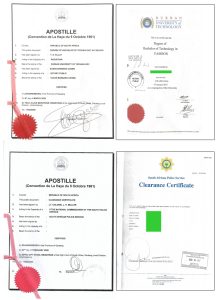

The word apostille is from the French language and known as an official certificate or stamp, that a person can request from the government, in order to use their public documents overseas. These documents include birth, death or marriage certificates, degree, diplomas and matric certificates, police clearance certificates, etc. The apostille stamp helps authenticate an official document so that it can be legally recognised in foreign countries. An apostille stamp only works in countries that are contracted to The Hague Convention of 5 October 1961. Travelling to countries which are non-Hague Convention members will require you to go through Embassy Legislation. Below are the various departments where one can get an apostille stamp in South Africa.
In South Africa, one can get an apostille stamp at the South African High Court. South Africa as a member state of the Hague Convention appointed The South African High Court as the designated authority to issue Apostille stamps. The High court in South Africa is the supreme court of law, therefore has jurisdiction over all matters, including issuing of apostilles. A notary public will have to notarise your document and then it will be apostilled at the High Court.
This is the process which you will have to through to get your document apostilled. You’ll need to get in contact with the High Court’s registrar, who works with all administration. Provide them with a notarised copy of your original document, which you will receive back in two to five days apostilled, for legal use in another country. Below is an example of what an Apostle by the High Court looks like.


Department of International Relations and Cooperation (DIRCO) in Pretoria is another department that is able to issue an Apostille stamp in South Africa. DIRCO serves the same purpose as The South African High Court when it comes to issuing Apostille stamps. Its main purpose is to assist in the creation of international law and the application of its rules. They also deal with foreign affairs. This entails that DIRCO is permitted to issue Apostilles. The legalisation division at DIRCO is the sector that does the Apostles of documents for legal use in other countries. They usually take about 2 to 4 weeks to have your documents ready. It used to take about 2 days, but since Covid-19 the waiting time has increased and they don’t allow walk-ins anymore.
DIRCO has to abide by the following rules in order for them to issue an apostille stamp: they need to verify that the documents are still legitimate. You must let them know which country you’ll be sending the documents to so that they can determine whether you need an Authentication certificate or an Apostille. You may first need to get your documents stamped or signed by an appropriate institution or department, depending on your documents. If that is the case then either a magistrate or a registrar of the South African High Court would have to sign the documents before DIRCO can provide you with the relevant Authentication Certificate or Apostille.
There are also Apostille agencies verified by DIRCO and the South African High Court to issue Apostilles. They can help with acquiring an Apostille stamp of your official documents to use outside of South Africa. Below is an example of an Apostille from DIRCO.

At SA Apostille , we provide official document legalisation at a more convenient time through the High Court of Pretoria or DIRCO. We are aware of the challenges involved in planning an international vacation, and we can reduce your stress by assisting you in getting an apostille for your journey. Our team has years of experience in helping people and businesses get papers apostille-certified in South Africa for use in nations that are signatories to the Hague Convention. Send in your documents over to us and we will help you Apostille them within two days. Contact us for all your Apostille needs at 081 347 6060 | 012 348 3134 or send an email: info@apostillelegalisation.co.za